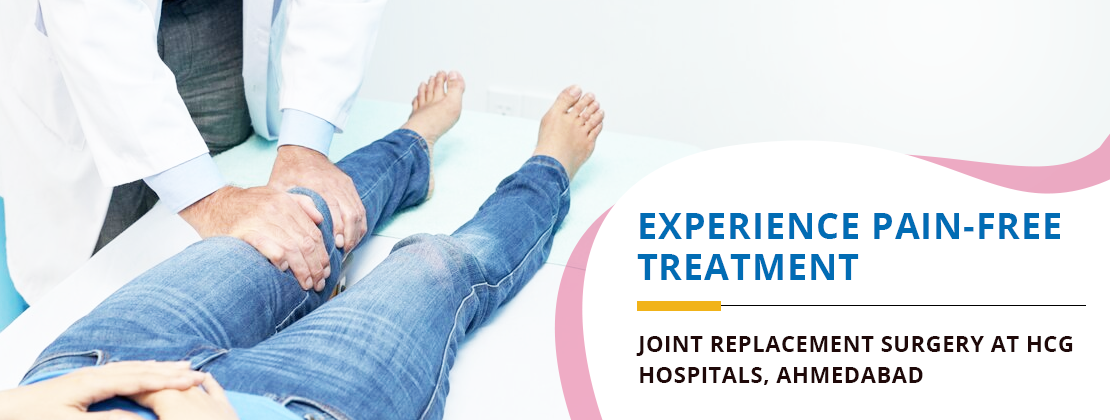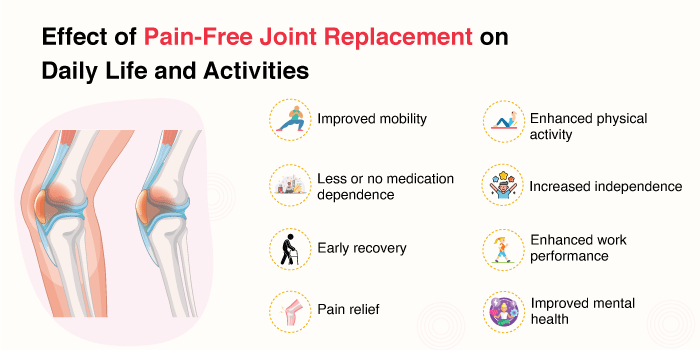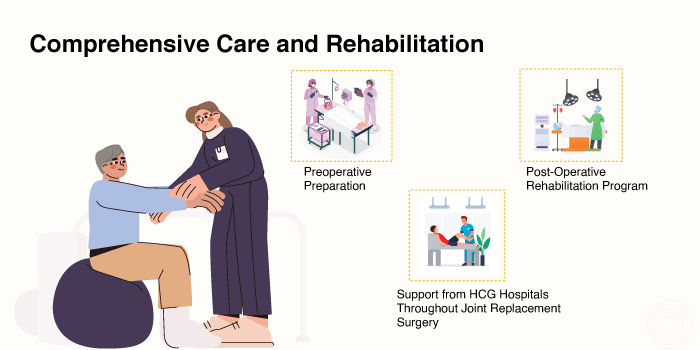
Home / Blog / Experience Pain-Free Treatment - Joint Replacement Surgery at HCG Hospitals, Ahmedabad
Table of Contents
Joint replacement surgery is a major procedure that involves replacing a damaged joint with an artificial one. Its benefits include pain relief and restoration of joint functions in patients diagnosed with advanced arthritis, joint trauma, or other degenerative conditions. Joint replacement surgery includes knee replacement surgery, hip replacement surgery, and shoulder replacement surgery.
Joint health is important for maintaining flexibility, mobility, and overall quality of life. Healthy joints allow an individual to engage in physical exercises, perform routine activities, and avoid discomfort and pain associated with joint disorders. People who focus on maintaining joint health are at low risk of developing chronic diseases, such as osteoporosis, arthritis, and musculoskeletal disorders.
Joint pain limits mobility, reduces the ability to perform routine activities, and significantly reduces the quality of life. If performed correctly, joint replacement surgery benefits include relief from chronic joint pain, improved joint function and mobility, and enhanced quality of life.
Before recommending joint replacement surgery, doctors carefully assess the case to evaluate if joint replacement surgery is the right treatment approach. This surgery is performed under anaesthesia.
During knee replacement surgery, the surgeon makes a 6—to 10-inch incision in the knee and removes the damaged cartilage surface on the tibia, femur, and some bone. The removed cartilage and bone are then replaced with metal components. The knee replacement surgery also involves patella resurfacing, spacer insertion, and incision closure.
During the hip replacement surgery, the surgeon makes an incision on the hip and removes the damaged femoral head. A metal socket is implanted into the pelvic bone, and a ceramic or metal ball is attached to the femur. The hip replacement surgery also involves spacer insertion and closure of the incision.
During shoulder replacement surgery, the surgeon makes an incision, usually along the front end of the shoulder. The surgeon then removes the damaged part of the humeral head and the glenoid. A plastic socket is implanted into the glenoid, and a metal ball placed on a stem is inserted into the humerus. The incision is then closed.
Here’s Dr. Priyank Gupta sharing interesting insights on Arthrtis condition:
Surgeons recommend joint replacement surgeries in various cases. These include severe joint pain that limits daily activities, chronic swelling and inflammation not relieved by rest or medications, significant joint damage on X-rays, and failure of conventional treatment, such as medications, injections, and physical therapy.

A pain-free treatment can significantly improve daily life and activities and offers several benefits to enhance the quality of life. The joint replacement surgery benefits include:
HCG Hospitals, the best orthopaedic hospital in Ahmedabad, offers comprehensive diagnostic and management support to patients suffering from various orthopaedic diseases. The orthopaedic team at HCG Hospitals comprises experienced orthopaedic surgeons, physical therapists, and paramedical staff to provide the best care.
The hospital is equipped with state-of-the-art technology and facilities that ensure the highest standard of patient care. At HCG Hospitals, we utilise advanced tools and equipment to enhance surgical precision and improve patient outcomes.
Here is one of our patients, Mr. Aditya Jain, sharing his experience undergoing knee replacement surgery at HCG Hospitals, Ahmedabad:

The patients undergoing joint replacement surgery undergo a comprehensive medical evaluation, including a physical examination and imaging tests. The preoperative testing includes blood tests, an electrocardiogram, a chest X-ray, and other required examinations. The surgeons may also review the patient’s current medications and adjust or stop certain medications.
The patients are also advised to avoid smoking, manage their weight, and limit alcohol consumption for several weeks before the surgery. All the details related to the surgery are shared with patients before their procedure.
The rehabilitation program for joint-replacement surgery patients aims at managing pain and swelling, gradually improving mobility, and avoiding post-operative complications. Activities at the post-operative rehabilitation program include wound care, circulation, breathing exercises, and assisted movement. As the patients recover, they may undergo physical therapy, assisted walking, functional activities, training to improve coordination and balance, and advanced strengthening exercises.
HCG Hospitals offers complete support at all levels to patients undergoing joint replacement surgeries. Preoperative support includes consultation and evaluation, preoperative counselling and patient education, diagnostic tests, and surgical optimisation.
The perioperative support at the HCG hospitals includes implementing advanced surgical techniques, providing expert surgeon services, minimally invasive procedures, and state-of-the-art operating facilities.
The post-operative support offered by the HCG hospitals includes intensive monitoring, pain management, rehabilitation and physical therapy, discharge planning, and home care. Patients may also expect regular check-ups and long-term follow-up care.
Pain-free treatment involving joint replacement surgery offers several advantages, including reduced pain and swelling, early recovery, improved mobility and independence, enhanced physical activity, and improved mental health.
Patients with advanced joint disorders who have not seen results with conventional therapy, such as medications, injections, and physical therapy, may opt for joint replacement surgery at HCG Hospitals. Patients may book an appointment with the best orthopaedic doctor in Ahmedabad by calling or visiting the HCG Hospitals’ website for orthopaedic surgery or consultation.
During the recovery period, your movement will be limited, and you may be prescribed certain pain-relieving medications along with physical therapy. The recovery will be gradual. It is important to follow the surgeon’s instructions and keep the surgery site clean. Do not miss any of the follow-up visits.
Patients experiencing severe joint pain and stiffness, who are not relieved with conventional, non-invasive treatments, and who have advanced diseases, such as advanced arthritis or other degenerative joint diseases, are eligible for joint replacement surgery.
Some of the potential risks associated with joint replacement surgery are infection, blood clots, blood loss, nerve damage, persistent pain, anaesthesia complications, implant issues, and allergic reactions.
Patients should maintain a healthy weight and avoid strenuous activities. They are also advised to adhere to the rehabilitation exercises and to use assisted devices if required. Patients should stay hydrated, eat a healthy diet, and practice good posture and body mechanics.
Complete recovery after joint replacement surgery depends on various factors, such as the type of joint replaced, the overall health of the patients, and adherence to post-surgical care instructions. Usually, a complete recovery may take about 3 to 6 months.
HCG Hospitals provides the facilities of top orthopaedic doctors in Ahmedabad. You may either call the hospital directly or visit its website to book an online appointment.
Some treatments that are alternatives to joint replacement surgery include arthroscopy, medications, injections, and physiotherapy.
Some of the orthopaedic conditions for which you may consult the top orthopaedic doctor in Ahmedabad include arthritis, back pain, fractures, osteoporosis, dislocations, tendonitis, sprains, ligament injuries, bursitis, Carpal Tunnel syndrome, tennis elbow, and hip dysplasia.
The duration of orthopaedic rehabilitation depends on various factors, such as the type of orthopaedic condition, the procedure performed, the overall health of the patients, and adherence to the surgeon’s instructions. Joint replacement surgeries may require rehabilitation for about 3 to 4 months.
Some lifestyle changes that can help in restoring joint health are weight management, hydration, a healthy diet, avoiding smoking, practicing good posture, managing stress, and using joint protection techniques, such as minimising joint stress during daily activities.